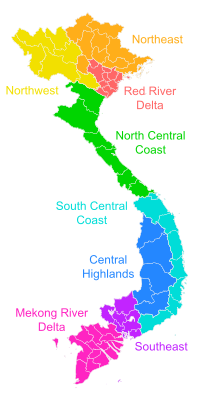Southern Vietnam (Vietnamese: Nam Bộ) is one of the three geographical regions of Vietnam, the other two being Northern and Central Vietnam. It includes 2 administrative regions, which in turn are divided into 19 First Tier units, of which 17 are provinces and 2 are municipalities. Known as Nam Bộ today in Vietnamese since 1975, it was historically called as Gia Định (1779–1832), Nam Kỳ (1832–1945, 1945-1949), Nam Bộ (1945), Bắc Việt (1949-1954), and Nam Phần (1954–1975).[1] Cochinchina or "Nam Kỳ" is a historical exonym for this region, originating during the French colonial period.

The origin of Southern Vietnam (Basse-Cochinchine in French, or Lower Cochinchina) was the Kingdom of Funan (from 1st century CE until 6th century CE) and Khmer Empire (from 8th century CE to 17th century). Southern Vietnam was conquered by the Nguyễn force in the 17th and 18th centuries from the Khmer kingdom.[2]
The main ethnicities in Southern Vietnam are Kinh, Khmer and Chinese.[3]
Administration
edit| Administrative region | First Tier units | Area (km2)[4][5] | Population (2022)[4] | Population density (people/km2) |
|---|---|---|---|---|
| Southeast (Đông Nam Bộ, Miền Đông) |
Bà Rịa–Vũng Tàu |
23,551.42 | 18,810,780 | 798.71 |
| Mekong River Delta (Đồng Bằng Sông Cửu Long) or Southwest (Tây Nam Bộ, Miền Tây) |
An Giang |
40,922.58 | 17,432,120 | 425.98 |
^† Municipality (thành phố trực thuộc trung ương)
See also
edit- Northern, Central and Southern Vietnam
- Regions of Vietnam
- Six Provinces of Southern Vietnam
- Cochinchina – a historical exonym for South Vietnam
- Champa, ancient coastal states in modern Central and South Vietnam
References
edit- ^ Royal Woodblocks of Nguyễn Dynasty – World documentary heritage (2021). "Significant collections § Fonds of the Phủ Thủ hiến Trung Việt or Office of the Governor of Trung Viet". mocban.vn. The National Archives Center No. 4 (State Records and Archives Department of Vietnam). Retrieved 30 March 2021.
- ^ Cooke, Nola (1998). "Regionalism and the Nature of Nguyen Rule in Seventeenth-Century Dang Trong (Cochinchina)". Journal of Southeast Asian Studies. 29 (1): 122–161. ISSN 0022-4634.
- ^ Ho, Hoang-Anh; Martinsson, Peter; Olsson, Ola (2022-03-01). "The origins of cultural divergence: evidence from Vietnam". Journal of Economic Growth. 27 (1): 45–89. doi:10.1007/s10887-021-09194-x. ISSN 1573-7020.
- ^ a b "Area, population and population density by province". General Statistics Office of Vietnam. Retrieved 12 April 2024. – Interactive table which you can view by making your selection in three boxes: (1) Cities, provinces: Select all; (2) Year: Select 2022; (3) Items: Select all.
- ^ Phê duyệt và công bố kết quả thống kê diện tích đất đai năm 2022 [Approve and announce the results of land area statistics in 2022] (Decision 3048/QĐ-BTNMT) (in Vietnamese). Ministry of Natural Resources and Environment (Vietnam). 18 October 2023. Retrieved 12 April 2024.
External links
edit- Southern Vietnam travel guide from Wikivoyage